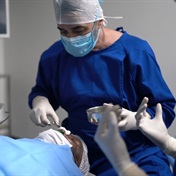Eating less meat and more vegetables is tied to a lower risk of cataracts, a British study says.
In a large dietary survey that followed people for as long as 15 years, researchers found that about three in 50 meat eaters had cataracts, compared to about two in 50 vegans and vegetarians.
The results translated to a 30% to 40% lower cataract risk among vegetarians and vegans compared with the biggest meat eaters.
"People who don't eat meat have a significantly lower risk of developing cataracts," said Naomi Allen, an epidemiologist at the UK's University of Oxford who co-authored the study.
Meat doesn’t promote cataracts
The study does not prove that eating meat promotes cataracts. Instead, eating a lot of vegetables might be protective. Some past research has linked certain nutrients in plant foods to a lowered risk of cataracts. Or a vegetarian diet may simply be a sign of other healthy behaviours that contribute to the lowered risk.
The new findings actually contradict a study done in India, where a vegetarian diet was associated with high numbers of cataracts, said Dr Jack Dodick, who chairs the department of ophthalmology at New York University Langone Medical Centre.
"It means that still to this day we don't know what influences cataracts. It may be more lifestyle. There may be other factors in causing cataract other than diet," Dr Dodick, who did not work on the current study, said.
Survey
The British researchers asked more than 27,600 people older than 40 to fill out dietary surveys between 1993 and 1999, then monitored the participants' medical records between 2008 and 2009 to see if they developed cataracts. Almost 1,500 had cataracts during the follow-up period.
The highest risk was seen among the heaviest meat-eaters - those who consumed more than 100 g of meat daily. Moderate meat eaters were only slightly less likely to develop cataracts. Fish eaters' risk was 15% lower than that of the heavy meat eaters, vegetarians' 30% lower and vegans' 40% lower.
This study, published in the American Journal of Clinical Nutrition, was well done, Dr Dodick said, but there are "still a lot of questions that need to be answered."
Whether nutrition really plays a role in cataract risk is still not clear cut, he said.
Developing cataracts
It's generally accepted that if you live long enough everyone will develop a cataract, Dr Dodick added.
"It's the most performed operation in the US," he said. "Approximately 3.5 million cataract surgeries are performed a year."
To decrease the probability of early onset cataracts, "the top of my list would be always protect eyes against ultraviolet rays when outdoors" Dr Dodick said.
"The moral of the story is, live life in moderation," Dr Dodick added. "A healthy active lifestyle with exercise might decrease the risk of cataracts."
(Reuters Health, Leigh Krietsch Boerner, April 2011)
Read more:




 Publications
Publications
 Partners
Partners














